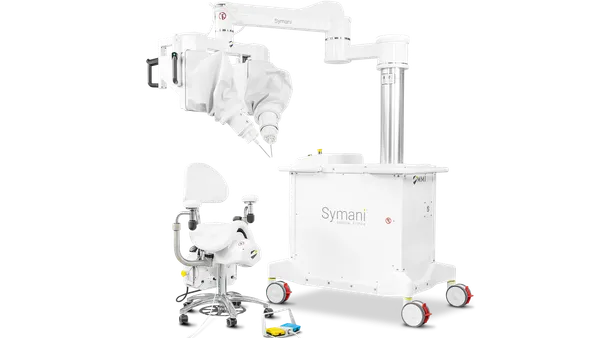Dive Brief:
- Physician and investor interest in adopting continuous glucose monitor (CGM) technology boomed at the American Diabetes Association's (ADA) annual meeting over the weekend. William Blair analyst Margaret Kaczor noted that many CGM sessions were standing-room only amid growing use of the technology by Type 1 patients, with manufacturers eyeing the under-penetrated insulin-dependent Type 2 market, a population of at least 1.5 million people in the U.S. alone.
- Analysts also said interoperability of diabetes management devices dominated the conversation, with Medtronic unexpectedly partnering with closed-loop system app developer Tidepool to market an interoperable insulin pump, which would allow Medtronic pump users to pair with Dexcom CGMs.
- The scientific sessions also showcased a readout from the National Institutes of Health's six-month clinical trial of Tandem's Control-IQ algorithm. The company said the product improves time in range for insulin pump users and plans to submit it for FDA approval in the coming weeks.
Dive Insight:
ADA meeting attendees in recent years have been increasingly enthusiastic about using continuous glucose monitors, Cowen analysts wrote in a note to investors Monday.
"CGM is clearly continuing to build momentum towards becoming the standard of care for Type 1 patients (despite only 30-35% penetration today in the US). We were also pleasantly surprised by what seemed to be an increase in interest of CGM use within intensively managed Type 2 patients (<10% penetration currently)," Doug Schenkel and his team at Cowen said.
Abbott highlighted the benefits of its CGM in Type 2 patients, presenting real-world data showing FreeStyle Libre users experienced reduced, healthier hemoglobin A1c. But Jefferies analyst Raj Denhoy called the lack of FDA approval of FreeStyle Libre 2 at ADA a "notable absence." The next-generation device received a CE mark in October 2018.
Analysts said Abbott's data likely supports an integrated continuous glucose monitor (iCGM) designation from FDA, which would challenge Dexcom's G6, currently the only device with that label. But with G7 expected to launch in 2020, analysts don't anticipate a FreeStyle Libre 2 introduction to significantly harm Dexcom.
"[W]e continue to view this market as big enough for two or more players and that better technology will drive adoption of the CGM category higher. In the end, we believe different patients will be attracted to the players for various reasons given the features of each device," Kaczor wrote.
The ADA meeting was also a platform for a newly published, ADA and JDRF-endorsed international consensus on time-in-range, developed by a group of 43 physicians, researchers, and individuals with diabetes tasked with creating guidance on how to best interpret and report CGM data for various Type 1 and Type 2 patient groups including pregnant women and older individuals.
"This has significant implications on clinical practice, and importantly for investors, CGM adoption. As time in range continues to become more prevalent in clinician offices, expect more and more patients to be recommended CGM, the only tool to measure time in range (and time in hypo)," Cowen analysts wrote, indicating the metric will likely trump HbA1c levels going forward.
On the insulin delivery front, Tandem Diabetes presented data on its Control-IQ algorithm from a six-month pivotal trial run by NIH, which the company said it plans to submit to FDA for regulatory approval in the coming weeks. The algorithm, born from technology developed by Dexcom subsidiary TypeZero Technologies, is aimed at using G6 data to predict glucose levels and accordingly adjust insulin delivery from the t:slim X2 insulin pump, approved by FDA in February as the first interoperable insulin pump.
Among 168 randomized Type 1 diabetes patients age 14 and older, participants whose therapy was augmented by Control-IQ experienced time in range 71% of the day, compared to 59% in the control arm. Although the trial had no adverse events and analysts believe results were good enough to support FDA approval, certain key metrics were underwhelming. Time in range was largely lower than expected, according to analysts.
Tandem said it continues to anticipate the product launch in the second half of 2019. Shares in the company fell more than 8% in early trading Monday.
Diabetes data nonprofit Tidepool, which is developing a yet-to-be-cleared hybrid closed loop system app for iPhone and Apple Watch, announced over the weekend it will work with Dexcom's G6, building on its Insulet partnership announced last year. More surprisingly, Medtronic announced it will develop its own Tidepool Loop-compatible pump.
"While this move could help defend the company’s pump hardware market share over time, it could represent a material headwind to its longer term CGM revenues," the Cowen note said. "[M]anagement is clearly confident in its CGM pipeline eventually competing head to head vs. [Abbott/Dexcom]. Time will tell."
Medtronic, whose diabetes unit fell close to 3% year over year in the most recent quarter, also announced pivotal trials of its MiniMed 780G closed loop system and its latest Guardian CGM sensor over the weekend.













